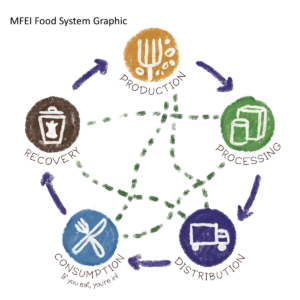Project Overview
Information Products
Commodities
Practices
- Education and Training: decision support system, focus group, participatory research
- Sustainable Communities: community development, community planning, infrastructure analysis, leadership development, local and regional food systems, partnerships, public participation, social capital, sustainability measures, values-based supply chains
Proposal abstract:
AERO's Montana Food Economy Initiative (MFEI) strengthens the network of Montana values-based community food systems to ensure producer sustainability and resilience, and support community economic, environmental, social, and human health. MFEI emphasizes coordinating cross-sector engagement across all parts of the food system (producer, processor, distributor, consumer, recovery) to support critical producer sustainability (see MFEI Food System Graphic).
Regional assessment data from MFEI's 2017 project funded by WSARE's Producer+Professional grant identified gaps between producers and other local food system stakeholders, risking diminished producer viability. MFEI's 2020 project, funded by WSARE's "Research to Grassroots" grant, sought to fill those gaps by developing a producer-led Advisory Board to help design and mentor implementation of discrete, shovel-ready producer-led projects that enhanced on-farm resilience and cross-sector engagement, and also built producers’ collaborative leadership skills for implementing community projects. Participant surveys from this effort identified a strong interest in continued cross-sector collaborations, particularly to assess, develop, and implement strategies for maturing developing community food systems.
The 2022 MFEI project offers Community Food System Assessments (CFSAs) to Fort Belknap, Billings, and Helena communities. The assessment focuses on coalition-building, mapping community assets, crafting a logic model, and developing metrics. The CFSA, facilitated by a trained assessor, supports the community in attracting a network of stakeholders across sectors (health, education, food, business) working with producers to implement strategies that strengthen community food system priorities. The 2020 MFEI producer-led Advisory Board cohort will help with assessment design, ensuring it reflects Montana’s landscape, and will participate as sector experts during the assessment. AERO anticipates the coalition networks will coordinate and implement at least one short-term, producer-led project using the MFEI 2020 project model. A Local Food Coordinator residing in each community, will help gather and build engagement among stakeholders throughout the CFSA and project implementation.
Project objectives from proposal:
As stated above, AERO’s MFEI works to strengthen the network of Montana values-based community food systems to ensure producer sustainability and resilience, and support community economic, environmental, social, and human health.
Specifically in the 2022 MFEI project, we seek to:
- Increase Fort Belknap, Billings, and Helena’s community awareness about what constitutes a sustainable, resilient local food system
- Support three communities (Fort Belknap, Billings, and Helena) in attracting a network of cross-sector food system stakeholders to work with producers to implement strategies that strengthen community food system priorities
- Help build diverse, cross-sector relationships and coalitions in Fort Belknap, Billings, and Helena, and connect these community food systems into a statewide network
- Increase the capacity of local communities to assess food system needs and opportunities
- Increase the capacity of local communities to implement producer-led projects that will strengthen the resilience and sustainability of their community food system
